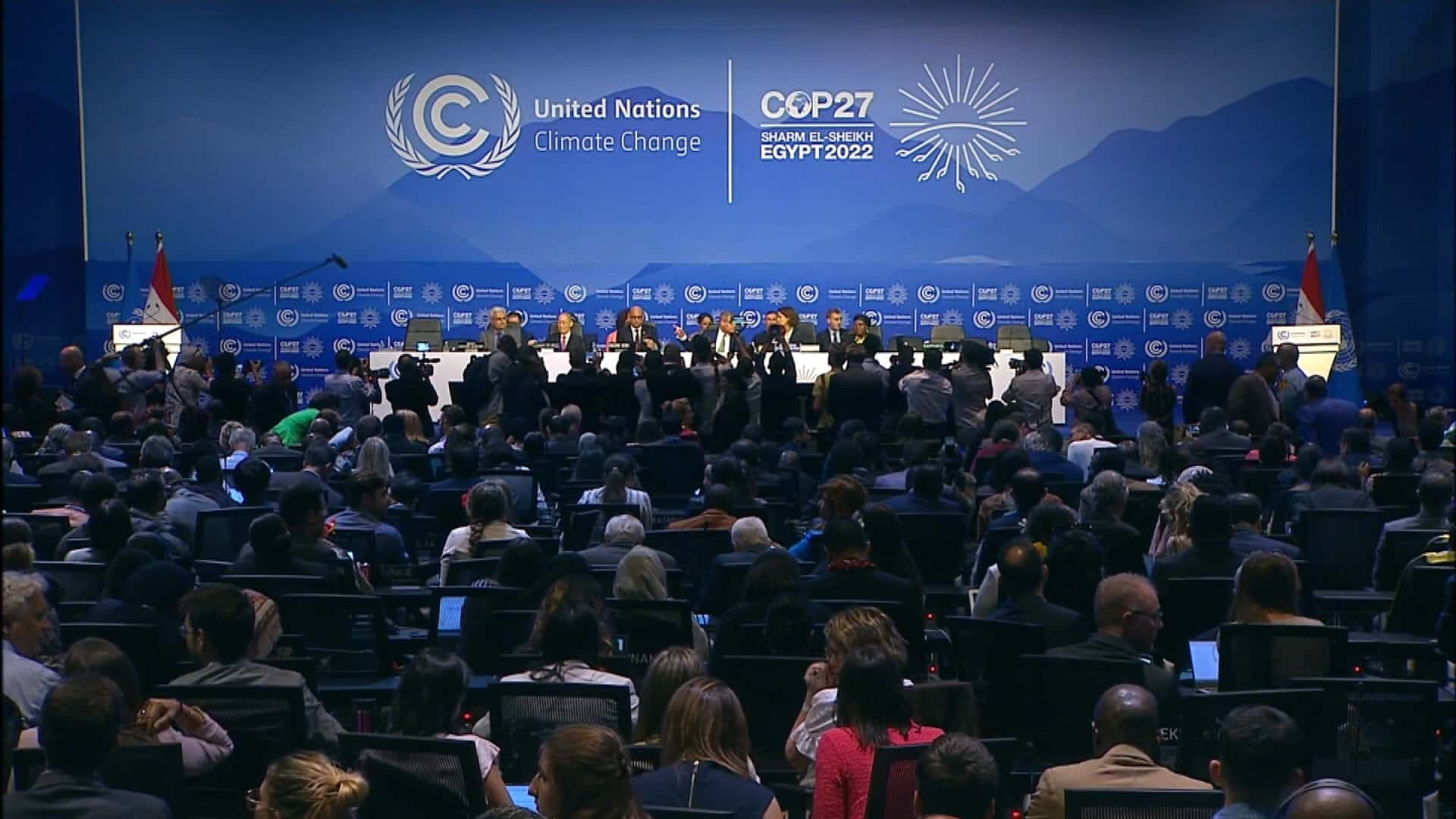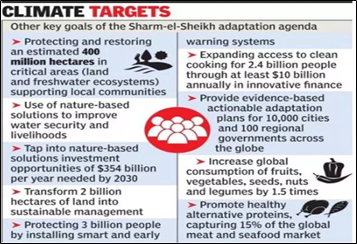What’s in today’s article:
- About the COP27 – Sharm-El-Sheikh Adaptation Agenda
- Infrastructure Resilience Accelerator Fund
Why in news?
- In order to mitigate the disastrous effects of climate change, the COP27 presidency recently launched the Sharm-el-Sheikh Adaptation Agenda.
- The agenda outlines 30 goals to improve resilience for 4 billion people living in the most climate vulnerable communities by 2030.
- Also, during the COP 27 Summit, Coalition for Disaster Resilient Infrastructure (CDRI) announced setting up the Infrastructure Resilience Accelerator Fund (IRAF).
COP27 – Sharm-El-Sheikh Adaptation Agenda:
- Background:
- According to Intergovernmental Panel on Climate Change (IPCC) analysis, nearly half of the world’s population will be at risk of severe climate change impacts by 2030, even in a 1.5-degree Celsius world.
- About the agenda:
- The COP27 Presidency recently announced the launch of the Sharm-El-Sheikh Adaptation Agenda in collaboration with the High-Level Champions at the ongoing COP27.
- At the COP21, in Paris, nations agreed that greater and more ambitious climate action is urgently needed to accomplish the Paris Agreement’s goals.
- Nations chose to designate two High Level Champions to connect the efforts of governments with the various voluntary and collaborative actions made by cities, regions, businesses and investors.
- Nigel Topping and Dr. Mahmoud Mohieldin are the COP27 High-Level Champions.
- The agenda outlines 30 Adaptation goals to enhance resilience for 4 billion people living in the most climate vulnerable communities by 2030.
- Each outcome presents global solutions that can be adopted at a local level to respond to local climate contexts, needs and risks, in order to protect vulnerable communities from rising climate hazards, such as extreme heat, drought, flooding, etc.
- Collectively, these outcomes represent the first comprehensive global plan to rally both State and non-State actors behind a shared set of adaptation actions.
- These actions are required by the end of this decade across five impact systems:
- Food and agriculture,
- Water and nature,
- Coastal and oceans,
- Human settlements and infrastructure, and
- Including enabling solutions for planning and finance.
- The COP27 Presidency recently announced the launch of the Sharm-El-Sheikh Adaptation Agenda in collaboration with the High-Level Champions at the ongoing COP27.
- Significance: The Agenda emphasises –
- Mobilising USD 140-300 billion from public and private sources for adaptation and resilience.
- Encourage 2,000 of the world’s greatest corporations to consider physical climate risk and create actionable adaptation plans.
- The need for all actors to count on evidence-based, practical adaptation plans, to make climate risks clear and accessible, and to implement locally-led adaptation principles.
- How will it be helpful to India?
- The Sundarban region, which spans India and Bangladesh and is home to 7.2 million of the world’s most vulnerable people as well as the world’s largest mangrove forest, would benefit from adaptation efforts.
- Mangrove forests can absorb four to five times more carbon emissions than landed tropical forests.
Infrastructure Resilience Accelerator Fund (IRAF)
- Recently, CDRI has announced setting up the Infrastructure Resilience Accelerator Fund (IRAF) with allocation of $50 million.
- The CDRI, launched by PM Narendra Modi in New York in 2019, is a partnership of national governments.
- It aims to promote the resilience of new and existing infrastructure systems to climate and disaster risks in support of sustainable development.
- Besides India, it currently has 28 other members.
- This fund will support global action to build robust infrastructure, especially in developing countries and small island developing nations, that can withstand the impacts of climate change.
- IRAF will be a multi-donor trust fund, managed by UN Multi-Partner Trust Fund Office, New York.
- Supported by India, the UK, Australia and the European Union, the IRAF’s multi-pronged programme will offer:
- customised technical assistance, capacity building, research, knowledge management, and advocacy across the infrastructure life cycle for countries at all stages of development.
Last updated on June, 2025
→ UPSC Notification 2025 was released on 22nd January 2025.
→ UPSC Prelims Result 2025 is out now for the CSE held on 25 May 2025.
→ UPSC Prelims Question Paper 2025 and Unofficial Prelims Answer Key 2025 are available now.
→ UPSC Calendar 2026 is released on 15th May, 2025.
→ The UPSC Vacancy 2025 were released 1129, out of which 979 were for UPSC CSE and remaining 150 are for UPSC IFoS.
→ UPSC Mains 2025 will be conducted on 22nd August 2025.
→ UPSC Prelims 2026 will be conducted on 24th May, 2026 & UPSC Mains 2026 will be conducted on 21st August 2026.
→ The UPSC Selection Process is of 3 stages-Prelims, Mains and Interview.
→ UPSC Result 2024 is released with latest UPSC Marksheet 2024. Check Now!
→ UPSC Toppers List 2024 is released now. Shakti Dubey is UPSC AIR 1 2024 Topper.
→ Also check Best IAS Coaching in Delhi























